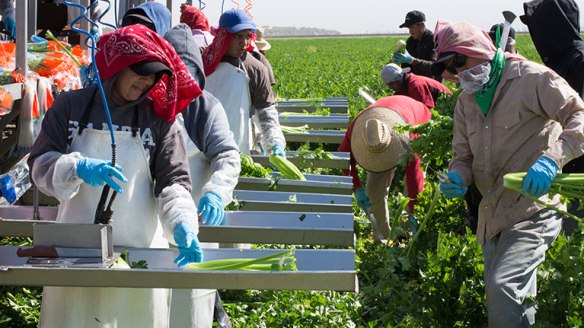
Georgina Vazquez de los Reyes, National Programme Officer, CO Mexico
Farmers and workers on the Mexico-Guatemala border have long relied on informal cross-border migrant labour, although these practices open the way to exploitation and abuse, and in the era of COVID-19, increase health and safety risks. Now, an ILO project is working with local organizations to promote fairer and safer recruitment practices.
Luis López*, the owner of a coffee finca (farm) in the Mexican state of Chiapas, is worried. Like most coffee producers near the southern border he relies on migrant Guatemalan workers, mostly informally recruited and employed, to pick and prepare his high-quality coffee for export. But this year the COVID-19 crisis has closed the border, and he fears he will not be able to gather the harvest in September.
Meanwhile, in the Guatemalan border town of Huehuetenango, Manuel Rosales* waits anxiously to hear from the informal recruiters (enganchadores) if and when he will be able to cross into Mexico for informal, seasonal, agricultural work. He and his colleagues worry that the pandemic-related restrictions may mean jobs are not available or that the working conditions or wages may be poor.
This type of informal, seasonal migration is particular to border areas and makes it challenging to regulate and enforce good recruitment practices. Informal recruitment is common in the region’s agriculture sector and is done through informal networks, such as family, acquaintances, or the enganchadores.
A lack of information on formal recruitment systems, the seasonal nature of the work, difficulties in cross-border recruiting, and the paperwork involved in registering formal workers, mean that migrant workers and employers tend to use irregular systems. In some cases, the enganchadores may even supervise workers and distribute salaries. But this also makes it more difficult to prevent exploitation and abuse.
Informal practices carry no legal protection and are difficult to regulate. The situation can be worse for women migrants, those on tied visas (tying them to a particular employer or to a spouse on a visa), or indigenous migrant workers who may not speak Spanish.
Fair recruitment has become even more crucial during the COVID-19 pandemic because agricultural workers have been categorized as essential workers. So, ensuring their health and safety during recruitment, transportation, and at the workplace and in employer-provided accommodation is particularly important.
Addressing the challenges
To address these challenges and promote fair recruitment in agriculture supply chains, the ILO’s EU-funded REFRAME project is working with a number of Mexican agricultural associations, including the Coffee and Banana Producers’ Associations of the Soconusco Region in southern Chiapas, the International Product Alliance to Promote a Socially Responsible Industry (AHIFORES) , and the civil society organization, Verité.
According to Yunyuney Martínez, Chief Manager at AHIFORES, their members are increasingly willing to move towards more regulated recruitment systems where they take the lead in recruitment and monitoring of their labour supply chain.
“We understand fair recruitment as the first ’link of the chain’ in the creation of an integral labour ecosystem that is fair and successful,” Martinez says. “As a result of the COVID-19 crisis we have seen both workers and employers concerns around the upcoming season, both in terms of ensuring labour supply and safe and healthy working conditions. Thus we are committed to provide all the necessary tools to ensure our sector keeps functioning and even sets an example on how to do so under the current crisis”.
Support for better systems
Together, the ILO and AHIFORES are developing tools and standards – in line with international labour standards and the General Principles and Operational Guidelines for Fair Recruitment – to help the alliance’s members adopt fair recruitment practices.
Projects include creating a Fair Recruitment Toolkit for the Agriculture Sector, which will help members obtain AHIFORES certification, and conducting a rapid assessment on how the sector’s needs are evolving during the COVID-19 crisis.
The ILO is also working with the agency CIERTO (which focuses on the fair recruitment of agricultural workers) to develop a practical guide for recruiting essential agricultural workers during the crisis.
By Georgina Vazquez de los Reyes, National Programme Officer, CO-Mexico
